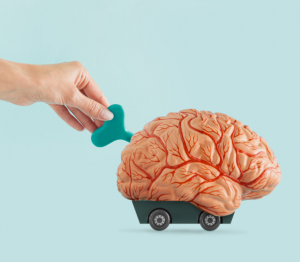
NB: There are so many discussions around the ownership of content—and rightly so—that I urge you to pause and reflect on the impact of AI on creative careers before reading further. Here’s some context from the Financial Times and Harvard Business Review to get you started.
These discussions are important, worthy, and necessary as digital natives and creatives learn to navigate the scope and implications of AI-generated content.
But this is not what I want to discuss further here.
Instead, I want to raise the possibility that, within a well-governed and well-supported legal framework, AI could genuinely change the world—and today my focus is on how that is so for neurodivergent creatives.
So, here are my three top takes:
1. Removing the ADHD ‘Wall of Shame’ and Reducing Performance Anxiety
When you write or create for a living, sometimes the blank page and blinking cursor can feel like judgment. Your mind churns with self-criticism before your words hit the page. Often, just the fear of making a mistake can prevent you from starting. The innate procrastination induced by this ‘wall of shame’—the invisible mental hurdle you have to get over to get started—is suddenly removed when you gather your thoughts with conversational support. This is not only empowering for neurodivergent individuals, but it also paves the way for greater output from those who may find it challenging to start in the ‘traditional’ manner of writing and editing a document.
Anyone who ever started a high school essay the night before it was due knows exactly what I’m talking about.
2. The ‘Rubber Duck’ Method and Broadening Diversity in Publication
Through conversation, we can develop our thoughts and gain confidence in our stance. This confidence carries over into our work output. We all need someone to talk to sometimes, especially to synthesize our thoughts. The programmers I work with usually refer to this as the ‘rubber duck’ method, and it’s been an effective tool for them throughout their careers.
After all, there is a reason it’s ‘Chat’GPT. The upshot of supporting people to get started and get published is an increase in the diversity of publications, which feels like a win to me.
If you ever felt like you just needed a little bit of one-on-one support to get going on a project, it’s now available to you 24/7.
3. Improving Overall Work Quality and Non-Judgmental Collaboration
If you’ve managed to overcome the shame and anxiety often associated with ADHD and taking the first steps to kick off a new project, your next challenge is ensuring it is of good quality. Generative AI-writing products, when properly directed, excel in editing grammar and summarising tone. AI tools can also collaborate with you in a constructive manner, making your end product feel more robust and validated, thereby lessening the fear of judgment.
AI doesn’t care about your opinions, or you – or anyone else, for that matter. When you use its capabilities to organise your thoughts (rather than asking it to purely generate content), it can assist you in finding and verifying sources, honing your tone, and building your confidence.
Ever wanted to change the status-quo, challenge a big idea or simply just articulate your ideas clearly? You’ve now got the resources at your fingertips.
There is big potential here. We live in a world where many voices go unheard due to access issues of a systemic nature. Data used to make big decisions is rarely representative of the whole population and filled with bias. It’s imperative we hear more from underrepresented groups and place greater emphasis on individual rather than generalised experience, when using data sets to make life-changing decisions. This is a major problem, effecting everyone, everyday – whether neurodivergent or not.
Finding tools of expression to create more data and inform AI-further, can and will lead to a fairer world. It’s one of the ways we can really use these tools to improve quality of life for everyone.
There is a chance to use these tool well and truly shape the world with broader diversity. And that could lead to real-world inclusion, if we let it.
But for now, my best guess is that generative AI will remain a force to be grappled with – much of its use hidden in plain sight. A frenemy to the publishing creative – both challenging and enhancing their work practices. If we get it right, the future could be a little brighter. So stay tuned.
